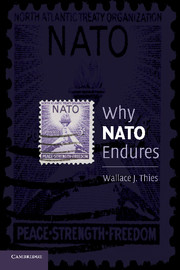Book contents
1 - The Curious Relationship
Published online by Cambridge University Press: 05 June 2012
Summary
A curious relationship has developed within the Atlantic Alliance, also known as the North Atlantic Treaty Organization (NATO), since its inception in 1949. NATO is widely regarded as the most successful alliance ever, and statesmen on both sides of the Atlantic have lavished praise upon it. They also complain incessantly about its shortcomings, most of which they blame on their counterparts across the sea. These complaints have not gone unnoticed by observers in the press and academia, who have been quick to pronounce the Alliance “in crisis,” or even on the brink of collapse. Looking back over the history of the Alliance, there seems to have been scarcely a year when it was not widely said to be in crisis, or at least in disarray.
Is it really the case that NATO is perpetually on the brink of collapse? Claims that NATO is in crisis have been frequent in no small part because the idea of a crisis is a useful one for insiders and outsiders alike. For insiders, warning of an actual or impending crisis is the rhetorical equivalent of a shot across the bow – a way of serving notice that trouble is brewing and something should be done about it forthwith. For outsiders, a crisis in the Alliance is the rhetorical equivalent of an alarm bell – a way of dramatizing a problem that might otherwise be dismissed as unworthy of space on a prestigious op-ed page or in a scholarly journal.
- Type
- Chapter
- Information
- Why NATO Endures , pp. 1 - 24Publisher: Cambridge University PressPrint publication year: 2009



